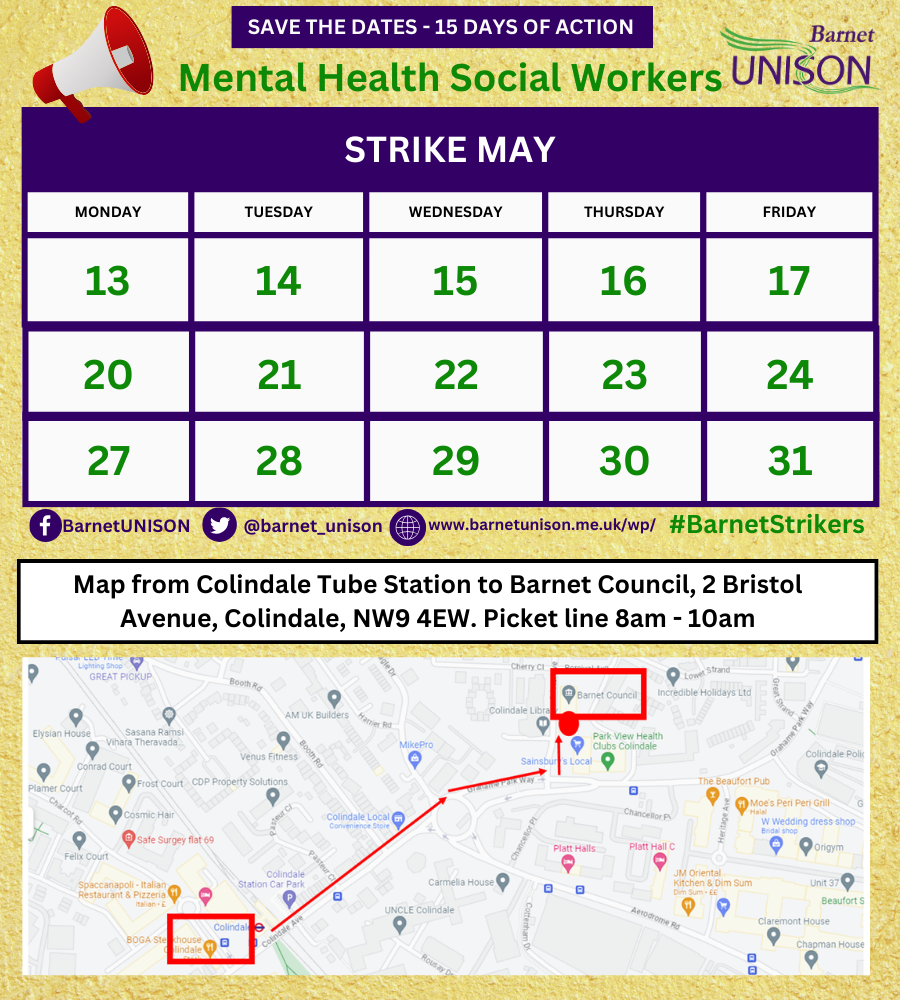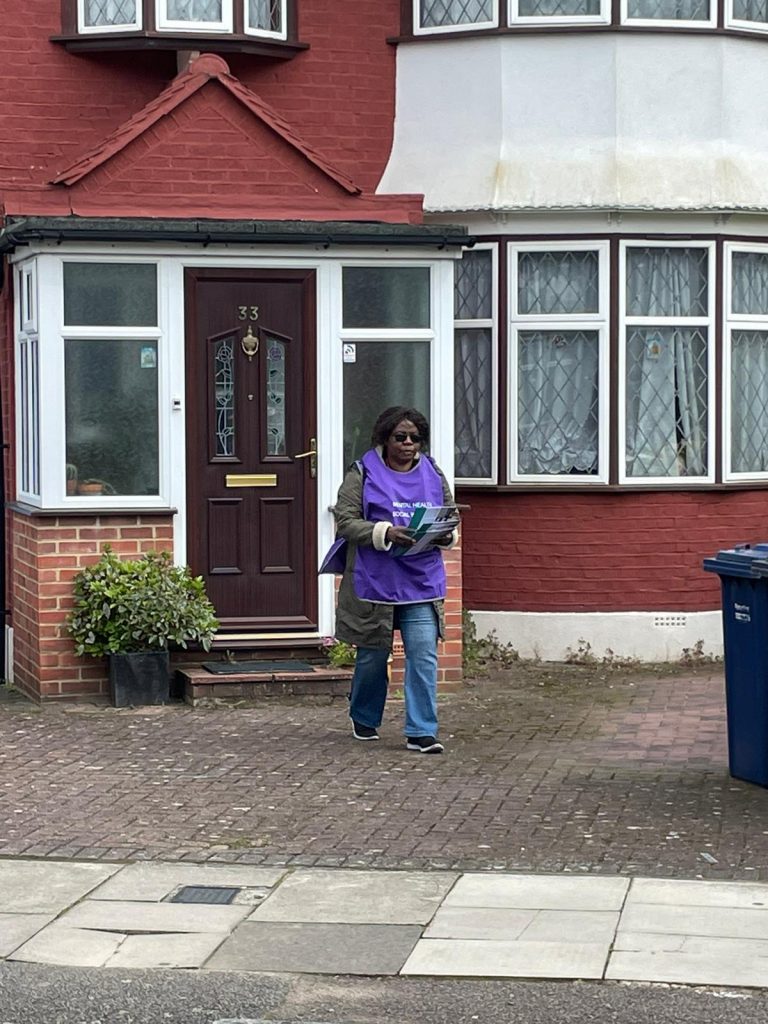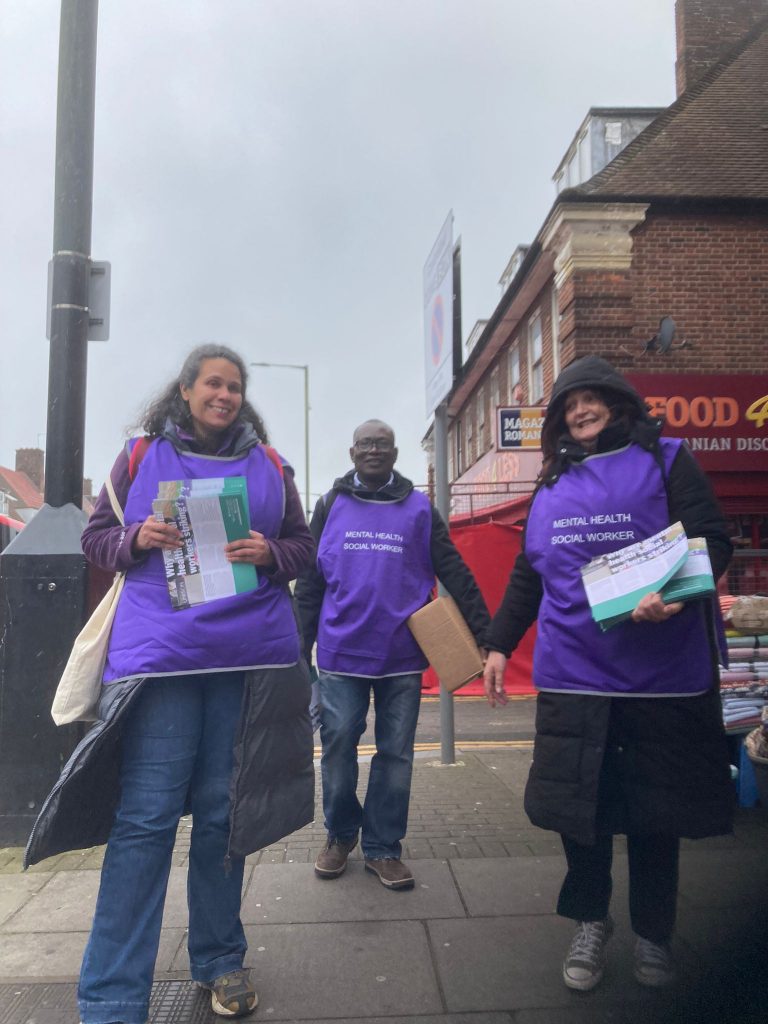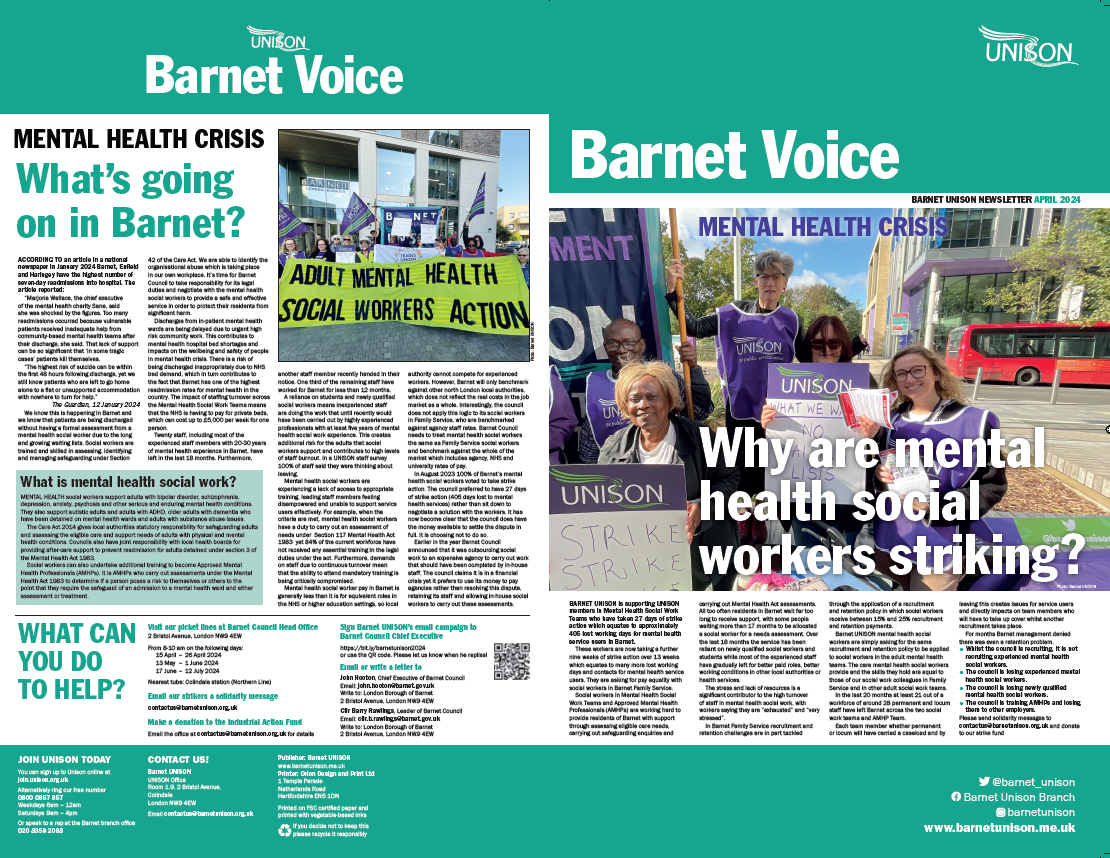Category: Recruitment
15 days of further strike action starts Monday 13 May
Mental Health strikers taking news of their strike to the streets in Edgware
Mental Health strikers taking news of their strike to the streets in Burnt Oak
Mental Health strikers out in High Barnet sharing news of our strike
Barnet UNISONs ‘Right to Reply’ – Mental Health social workers
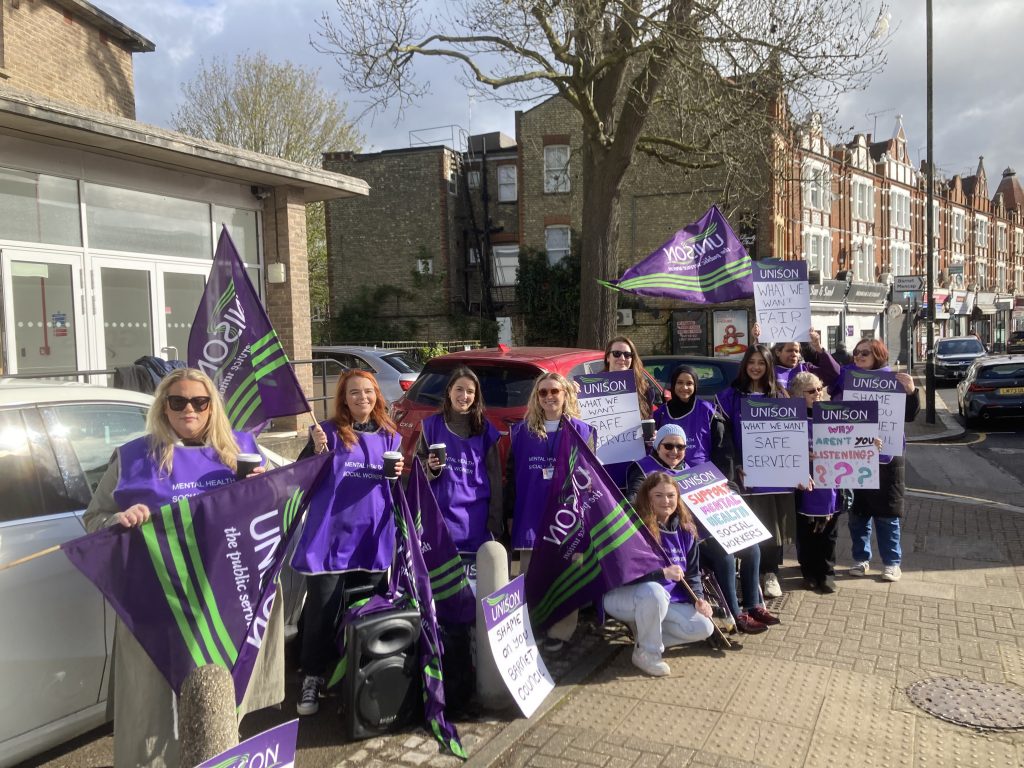
Barnet UNISON Mental Health social worker began the next phase of strike action on Monday 15 April 2024. They have now taken 32 days of strike action with another week of strike action week commencing 22 April 2024.
This is the longest running Mental Health social worker dispute in UNISONs 30-year history.
Our members feel they have been subjected to gaslighting by Barnet Council and not treated with the respect they deserve.
On Wednesday 17 April Barnet Council senior management chose to send an email to all their workforce which our members felt was a direct attack on their integrity.
Today, 19 April 2024, which is Day 32 of their strike action Barnet UNISON sent out their ‘Right of Reply’ to the communication sent by management.
Below is Barnet UNISONs ‘Right to Reply’
1. What is the strike about and who is striking?
The strikes that have taken place since September 2023 are being carried out by staff in three of the council’s six mental health social work teams based in Communities, Adults and Health. The industrial action is taking place due to a dispute on pay, where mental health social workers are calling for a 20% recruitment and retention payment to be paid to the mental health social workers in the three teams taking action. Their claim is that there are significant recruitment and retention issues in these teams.
UNISON RESPONSE
The industrial action is not due to a dispute in pay. Senior management are aware that the significant risks resulting from under resourced teams have forced staff from three mental health teams (Mental Health Social Care North, Mental Health Social Care South, and the AMHP team) to take industrial action.
Staff have been raising concerns since the restructure to mental health social care, which took place approximately 2 years ago. Unfortunately, senior management have not addressed the concerns raised, which has resulted in waitlists increasing from 4 to 17 months for a Care Act Assessment. This leaves residents with significant mental ill-health vulnerable and without necessary care and support. Increasing and persistent pressures have lead to a critical recruitment and retention crisis where staff are leaving the teams in high numbers.
There are 23 social worker and lead practitioner posts between the Mental Health Social Care North and South teams. In the past 18 months, 19 staff have left, with an additional worker who handed in her notice this week. Furthermore, the majority of the leavers were the most experienced staff members. In one of these teams, the figures demonstrate that when looking at the years of mental health experience of permanent staff, the team has lost 75% of the experience in the past year alone. The impact is that these teams are disproportionately comprised of social workers with very little, if any, mental health experience.
Our social work colleagues in Children and Families services have faced a similar recruitment and retention crisis in the past. Barnet Council has a recruitment and retention policy in place for such situations and this has been used to effectively stabilise the children’s social care workforce. Children’s social care receive a recruitment and retention payment, paid at three different levels varying between 15%, 20% and 25%, depending on the severity of their recruitment and retention problems. We are therefore simply asking for this policy, already in place for social workers in children’s services, to be equally applied to social workers in adults services. We have consistently demonstrated that we meet criteria for the policy to be applied and our view is that this will help stabilse our workforce in the same way it stablised children’s social care.
2. How long has the strike been going on for and what are the future strike plans?
The first strike action took place on 26 September 2023, and there have been 27 days of strike action up until this week. Unison is intending to increase the number of strike days over the coming months, beginning with a two-week strike that started on Monday 15 April. There are then plans for a three-week strike and four-week strike between now and mid-July.
UNISON RESPONSE
This is accurate. Unfortunately, as Barnet Council continue to dismiss the significant risks to Barnet residents, we have no alternative than to escalate the industrial actions. The British Association of Social Workers sets out that social workers are expected to raise awareness where resources are inadequate. Furthermore, Social Work England, the regulatory body for Social Workers, sets out that Social Workers should raise concerns about unsafe practice and should challenge practices, systems, and processes where necessary.
We see industrial action as a necessary extension of our responsibilities to advocate for those we serve and to take steps to protect them from harm and promote their wellbeing. We will continue to take this responsibility seriously and are committed to continuing our industrial action until Barnet Council negotiates to provide a stable and safe service.
3. What has the council done to negotiate with the unions on this issue?
The council has been open to negotiation with Unison on this issue. We have recently had two days of ACAS-facilitated negotiations and we are more than willing to continue to work together to find a solution. The council is of the view that the recruitment and retention challenges affect all social worker and occupational therapist recruitment and that this is a national challenge. Last year we offered to spend slightly more than would be needed to meet the payments requested by the mental health social workers, to pay all social workers and occupational therapists a £1,000 recruitment and retention payment. Through negotiations, the council has offered to increase this payment and / or fund additional social work posts. We are currently planning to resume talks with Unison on these matters.
UNISON RESPONSE
It took over six-months and 27 strike days for the council to go into ACAS talks with the trade union. Meanwhile, Barnet Council has threatened to use the Tory anti-trade union legislation against the workers and Unison at various times. Our view is that we have had two ACAS meetings, the first of which Barnet Council came to without any preparation and the request was therefore for them to return with the relevant data. At the second meeting, our view is that the data they brought had deliberately been grouped together to hide the issues and the request from the strikers was simply for Barnet Council to ungroup the data, which they have not done. We feel this request is reasonable and would be in line with the information kept and shared by senior management in children and families.
We feel that the data would demonstrate that the teams meet the criteria set out in the recruitment and retention policy, which is already applied to Children and Families social care.
To date, Unison has not been approached by any members other than mental health social care to say that they have recruitment and retention issues. What we do know is that we have conducted anecdotal conversations with our members across all the teams, all of whom who has responded have stated that they do not have recruitment and retention issues in their teams. If anybody reading this does have information that their teams are experiencing a recruitment and retention crisis, please contactus@barnetunison.org.uk.
4. Is the council employing agency workers to ‘break’ the strike, as reported in some media?
No. We are not employing agency workers to cover the strike action. We are concerned about the impact prolonged strike action will have on vulnerable residents and so have been looking at options to provide ‘life and limb’ capacity in ways that are fully in compliance with relevant legislation and guidance.
UNISON RESPONSE
Unison have been informed of the number of staff required for ‘Life and Limb’ capacity, and senior management are aware that there are more than this number of staff who remain in the teams whilst other staff are taking industrial action. There is therefore no legal justification for commission an agency to undertake this role.
Senior management emailed mental health social care workers on 10/4/24 stating that Barnet Council are temporarily commission an agency to “provide the mental health duty and triage function for a period of 3-4 months” to “mitigate” against industrial action. This is a role that is ordinarily fulfilled by permanent mental health social workers within the teams. The agency commissioned pulled out on 14/4/24 after Unison brought this to the agency’s attention. Since then, mental health social care were informed by senior management, whilst staff were taking industrial action, that Barnet Council are continue to seek other providers to outsource this work.
We see this as a way to undermine the strike and cannot understand why Barnet Council prefer to pay what senior management stated was an “extortionate” amount of money rather than resource their social care teams. Furthermore, this is known as “strike breaking” and the High Court has ruled that the legislation that allows employers to use agency workers to replace those on strike is unlawful, unfair, and irrational. You can read more here.
5. Is the strike having any impact on mental health services to residents?
We are committed to providing a safe service for our residents and we are grateful for the dedication and commitment of all our mental health social workers, who provide excellent support to our residents at a challenging time for adult social care nationally. We will ensure that regardless of industrial disputes, our services continue to support people with mental health needs.
UNISON RESPONSE
Our view is that the strike is impacting mental health social care to residents and we implore Barnet Council to negotiate with us. Taking the decision to strike is not something that any of us took lightly and is the last resort available to us to advocate for a safe service for our residents. We are in solidarity with our residents to protect and fight for the safe service that they need. We have received incredible support from our service users whilst taking industrial action, including from one service user group who not only have consistently joined us on the picket line, but have also wrote us songs for our strikes, and even created us T-shirts (which you can buy here!). You can read more testimonials from Barnet residents in our newspaper.
6. Why won’t the council agree to the request for a recruitment and retention payment for the three mental health teams taking action?
We simply don’t accept that the recruitment and retention challenges in these teams are worse than the overall situation for qualified social workers and occupational therapists or see that there is a market condition that would necessitate such a payment.
Looking first at vacancy levels, there are currently very few vacancies in the mental health locality teams (all but one of which are covered by agency members of staff) and none in the AMHP team. Other social work teams in adult social care have significantly higher vacancy levels. We know that the social work and OT recruitment market is tough and that other councils have very similar challenges with vacancies. The mental health teams are not in a worse position than others and it is great that agency workers have chosen to remain in the teams on permanent contracts and staff from other teams have chosen to transfer into mental health locality teams.
We also collated salary benchmarking data from 12 other outer London boroughs and our local mental health trust which showed that our pay is competitive. None of these councils had an extra payment for mental health social workers. Different pay arrangements exist for AMHPs, but ours are some of the most generous with all AMHPs on the social work grade paid at the lead practitioner grade. The average tenure of staff in the teams is at the average level for adult social workers in English councils according to the Skills for Care State of the Workforce 2023 report.
UNISON RESPONSE
Whilst the posts are filled, the salient points that the workers have been highlighting to senior management are that Barnet Council cannot retain social workers in the mental health social care teams and that the staff who they do recruit do not have sufficient, if any, mental health experience to work in a specialised mental health team. This contributes to increasing waitlists and significant unmanaged risks.
Our view is that whilst there is considerable pressure amongst all our colleagues in health and social care, the impact of the rushed mental health restructure which took place around 2 years ago continues to cause increased challenges for our teams. There are 23 social worker and lead practitioner posts between the Mental Health Social Care North and South teams. In the past 18 months, 19 staff have left, with an additional worker who handed in her notice this week. Furthermore, the majority of the most experienced staff members are those who have left. One of these teams alone has lost 75% of their mental health experience. This means that the teams are largely comprised of social workers with very little, if any, mental health experience.
Whilst the AMHP team currently has no vacancies, we know that 50% of their team are due to leave to take up roles in the NHS in the coming months. Furthermore, the AMHP service is staffed 24/7 by workers, including those within the Mental Health Social Care teams, and has been greatly impacted by the high turnover of staff within these teams. It is therefore currently run by very newly qualified workers. Furthermore, Barnet Council are training AMHPs but are not able to retain these workers.
Our colleagues who have left have largely left for positions which offer significantly better pay, reduced case loads, and a safer service. Barnet Council’s view is that their competitors are other outer-borough Councils, however, their competitors include: the NHS, which offers better pay and more progression; Agency work, which offers rates between £60-66k; and Universities which offer direct work with clients without statutory responsibilities, to name a few.
Read this extract, written by one of our colleagues who left this year in an open letter to the Chief Executive highlighting some of these areas:
“….In my new role as a social worker in an NHS specialist mental health team my salary is 10% higher than it was in a community team while my caseload involves working with fewer adults at risk of serious harm and in which risk is shared among a multi-disciplinary team including psychiatrists, psychologists and community nurses who have decades of mental health experience between them. This experience safeguards the adults we work with and reduces the likelihood of individual practitioners feeling overwhelmed and stressed which is a leading cause of staff burnout in Barnet.
Alongside improved pay, more manageable caseloads, better resources and being able to learn from experienced mental health practitioners I also currently benefit from specialist training, better lone working practices and team administrative support. When I worked for LBB one of the arguments managers gave as to not provide a recruitment and retention payment was that social workers experience the same issues wherever they work and conditions and pay are the same everywhere. This is something said to keep social workers in their place and to stop them asking for improvements. I am proof that it is not true.
In the two months since I left LBB my mental health, physical health and work/life balance has improved. My colleagues who remain do so because they are trying their best to create working conditions that will enable them to stay in their jobs so they can support residents of Barnet but so far management seems to be against its workers and against supporting adults in Barnet who would benefit from the expertise and support of specialist, experienced community mental health social workers.”
Read the full letter to the Executive Director
7. What will happen next?
The council will continue to negotiate with Unison to try and bring an end to this dispute. During this strike period, we will ensure that there is a minimum level of staffing in place and will consider the different legal options available to us to do this.
UNISON RESPONSE
Barnet Unison continue to implore senior management to take this dispute seriously and meet with us with accurate data. We continue to invite Barnet Council to meet with us and are hopeful that they will take the risks of the residents of Barnet seriously and commit to addressing the issues in order to provide a stable team and a safe service.
In the meantime, strikers will be out in the community raising awareness of the issues. We will be handing out 10,000 newspapers focusing on the strike, which you can read here.
Barnet UNISON information below as to how you can find out more about our campaign and what you can do to help.
How you can stay up to date or find out more
Please visit our dedicated webpage here or visit Community Care who have been giving us considerable coverage
How you can help advocate for the residents of Barnet to receive a safe service:
If you would like to join the cause in calling for a safe service for Barnet residents who have severe mental ill-health, and for those that support them, then we share some options around how you can help below:
- Join us on the picket line
- Buy a T-shirt
- Follow us / Share on social media
Twitter Facebook Instagram Website
- Sign Barnet UNISON’s email campaign to Barnet Council Chief Executive https://bit.ly/barnetunison2024. Please let us know when he replies!
- Make a Donation
Please donate money to our Industrial Action Fund:
Account Name: Barnet UNISON Industrial Action Fund
Account Number: 20039336 Sort Code: 608301
End.
Barnet UNISON Mental Health social worker began the next phase of strike action on Monday 15 April 2024. They have now taken 32 days of strike action with another week of strike action week commencing 22 April 2024.
This is the longest running Mental Health social worker dispute in UNISONs 30-year history.
Our members feel they have been subjected to gaslighting by Barnet Council and not treated with the respect they deserve.
On Wednesday 17 April Barnet Council senior management chose to send an email to all their workforce which our members felt was a direct attack on their integrity.
Today, 19 April 2024, which is Day 32 of their strike action Barnet UNISON sent out their ‘Right of Reply’ to the communication sent by management.
Below is Barnet UNISONs ‘Right to Reply’
- What is the strike about and who is striking?
- The strikes that have taken place since September 2023 are being carried out by staff in three of the council’s six mental health social work teams based in Communities, Adults and Health. The industrial action is taking place due to a dispute on pay, where mental health social workers are calling for a 20% recruitment and retention payment to be paid to the mental health social workers in the three teams taking action. Their claim is that there are significant recruitment and retention issues in these teams.
UNISON RESPONSE
The industrial action is not due to a dispute in pay. Senior management are aware that the significant risks resulting from under resourced teams have forced staff from three mental health teams (Mental Health Social Care North, Mental Health Social Care South, and the AMHP team) to take industrial action.
Staff have been raising concerns since the restructure to mental health social care, which took place approximately 2 years ago. Unfortunately, senior management have not addressed the concerns raised, which has resulted in waitlists increasing from 4 to 17 months for a Care Act Assessment. This leaves residents with significant mental ill-health vulnerable and without necessary care and support. Increasing and persistent pressures have lead to a critical recruitment and retention crisis where staff are leaving the teams in high numbers.
There are 23 social worker and lead practitioner posts between the Mental Health Social Care North and South teams. In the past 18 months, 19 staff have left, with an additional worker who handed in her notice this week. Furthermore, the majority of the leavers were the most experienced staff members. In one of these teams, the figures demonstrate that when looking at the years of mental health experience of permanent staff, the team has lost 75% of the experience in the past year alone. The impact is that these teams are disproportionately comprised of social workers with very little, if any, mental health experience.
Our social work colleagues in Children and Families services have faced a similar recruitment and retention crisis in the past. Barnet Council has a recruitment and retention policy in place for such situations and this has been used to effectively stabilise the children’s social care workforce. Children’s social care receive a recruitment and retention payment, paid at three different levels varying between 15%, 20% and 25%, depending on the severity of their recruitment and retention problems. We are therefore simply asking for this policy, already in place for social workers in children’s services, to be equally applied to social workers in adults services. We have consistently demonstrated that we meet criteria for the policy to be applied and our view is that this will help stabilse our workforce in the same way it stablised children’s social care.
- How long has the strike been going on for and what are the future strike plans?
- The first strike action took place on 26 September 2023, and there have been 27 days of strike action up until this week. Unison is intending to increase the number of strike days over the coming months, beginning with a two-week strike that started on Monday 15 April. There are then plans for a three-week strike and four-week strike between now and mid-July.
UNISON RESPONSE
This is accurate. Unfortunately, as Barnet Council continue to dismiss the significant risks to Barnet residents, we have no alternative than to escalate the industrial actions. The British Association of Social Workers sets out that social workers are expected to raise awareness where resources are inadequate. Furthermore, Social Work England, the regulatory body for Social Workers, sets out that Social Workers should raise concerns about unsafe practice and should challenge practices, systems, and processes where necessary.
We see industrial action as a necessary extension of our responsibilities to advocate for those we serve and to take steps to protect them from harm and promote their wellbeing. We will continue to take this responsibility seriously and are committed to continuing our industrial action until Barnet Council negotiates to provide a stable and safe service.
- What has the council done to negotiate with the unions on this issue?
- The council has been open to negotiation with Unison on this issue. We have recently had two days of ACAS-facilitated negotiations and we are more than willing to continue to work together to find a solution. The council is of the view that the recruitment and retention challenges affect all social worker and occupational therapist recruitment and that this is a national challenge. Last year we offered to spend slightly more than would be needed to meet the payments requested by the mental health social workers, to pay all social workers and occupational therapists a £1,000 recruitment and retention payment. Through negotiations, the council has offered to increase this payment and / or fund additional social work posts. We are currently planning to resume talks with Unison on these matters.
UNISON RESPONSE
It took over six-months and 27 strike days for the council to go into ACAS talks with the trade union. Meanwhile, Barnet Council has threatened to use the Tory anti-trade union legislation against the workers and Unison at various times. Our view is that we have had two ACAS meetings, the first of which Barnet Council came to without any preparation and the request was therefore for them to return with the relevant data. At the second meeting, our view is that the data they brought had deliberately been grouped together to hide the issues and the request from the strikers was simply for Barnet Council to ungroup the data, which they have not done. We feel this request is reasonable and would be in line with the information kept and shared by senior management in children and families.
We feel that the data would demonstrate that the teams meet the criteria set out in the recruitment and retention policy, which is already applied to Children and Families social care.
To date, Unison has not been approached by any members other than mental health social care to say that they have recruitment and retention issues. What we do know is that we have conducted anecdotal conversations with our members across all the teams, all of whom who has responded have stated that they do not have recruitment and retention issues in their teams. If anybody reading this does have information that their teams are experiencing a recruitment and retention crisis, please contactus@barnetunison.org.uk.
- Is the council employing agency workers to ‘break’ the strike, as reported in some media?
- No. We are not employing agency workers to cover the strike action. We are concerned about the impact prolonged strike action will have on vulnerable residents and so have been looking at options to provide ‘life and limb’ capacity in ways that are fully in compliance with relevant legislation and guidance.
UNISON RESPONSE
Unison have been informed of the number of staff required for ‘Life and Limb’ capacity, and senior management are aware that there are more than this number of staff who remain in the teams whilst other staff are taking industrial action. There is therefore no legal justification for commission an agency to undertake this role.
Senior management emailed mental health social care workers on 10/4/24 stating that Barnet Council are temporarily commission an agency to “provide the mental health duty and triage function for a period of 3-4 months” to “mitigate” against industrial action. This is a role that is ordinarily fulfilled by permanent mental health social workers within the teams. The agency commissioned pulled out on 14/4/24 after Unison brought this to the agency’s attention. Since then, mental health social care were informed by senior management, whilst staff were taking industrial action, that Barnet Council are continue to seek other providers to outsource this work.
We see this as a way to undermine the strike and cannot understand why Barnet Council prefer to pay what senior management stated was an “extortionate” amount of money rather than resource their social care teams. Furthermore, this is known as “strike breaking” and the High Court has ruled that the legislation that allows employers to use agency workers to replace those on strike is unlawful, unfair, and irrational. You can read more here.
- Is the strike having any impact on mental health services to residents?
- We are committed to providing a safe service for our residents and we are grateful for the dedication and commitment of all our mental health social workers, who provide excellent support to our residents at a challenging time for adult social care nationally. We will ensure that regardless of industrial disputes, our services continue to support people with mental health needs.
UNISON RESPONSE
Our view is that the strike is impacting mental health social care to residents and we implore Barnet Council to negotiate with us. Taking the decision to strike is not something that any of us took lightly and is the last resort available to us to advocate for a safe service for our residents. We are in solidarity with our residents to protect and fight for the safe service that they need. We have received incredible support from our service users whilst taking industrial action, including from one service user group who not only have consistently joined us on the picket line, but have also wrote us songs for our strikes, and even created us T-shirts (which you can buy here!). You can read more testimonials from Barnet residents in our newspaper.
- Why won’t the council agree to the request for a recruitment and retention payment for the three mental health teams taking action?
- We simply don’t accept that the recruitment and retention challenges in these teams are worse than the overall situation for qualified social workers and occupational therapists or see that there is a market condition that would necessitate such a payment.
Looking first at vacancy levels, there are currently very few vacancies in the mental health locality teams (all but one of which are covered by agency members of staff) and none in the AMHP team. Other social work teams in adult social care have significantly higher vacancy levels. We know that the social work and OT recruitment market is tough and that other councils have very similar challenges with vacancies. The mental health teams are not in a worse position than others and it is great that agency workers have chosen to remain in the teams on permanent contracts and staff from other teams have chosen to transfer into mental health locality teams.
We also collated salary benchmarking data from 12 other outer London boroughs and our local mental health trust which showed that our pay is competitive. None of these councils had an extra payment for mental health social workers. Different pay arrangements exist for AMHPs, but ours are some of the most generous with all AMHPs on the social work grade paid at the lead practitioner grade. The average tenure of staff in the teams is at the average level for adult social workers in English councils according to the Skills for Care State of the Workforce 2023 report.
UNISON RESPONSE
Whilst the posts are filled, the salient points that the workers have been highlighting to senior management are that Barnet Council cannot retain social workers in the mental health social care teams and that the staff who they do recruit do not have sufficient, if any, mental health experience to work in a specialised mental health team. This contributes to increasing waitlists and significant unmanaged risks.
Our view is that whilst there is considerable pressure amongst all our colleagues in health and social care, the impact of the rushed mental health restructure which took place around 2 years ago continues to cause increased challenges for our teams. There are 23 social worker and lead practitioner posts between the Mental Health Social Care North and South teams. In the past 18 months, 19 staff have left, with an additional worker who handed in her notice this week. Furthermore, the majority of the most experienced staff members are those who have left. One of these teams alone has lost 75% of their mental health experience. This means that the teams are largely comprised of social workers with very little, if any, mental health experience.
Whilst the AMHP team currently has no vacancies, we know that 50% of their team are due to leave to take up roles in the NHS in the coming months. Furthermore, the AMHP service is staffed 24/7 by workers, including those within the Mental Health Social Care teams, and has been greatly impacted by the high turnover of staff within these teams. It is therefore currently run by very newly qualified workers. Furthermore, Barnet Council are training AMHPs but are not able to retain these workers.
Our colleagues who have left have largely left for positions which offer significantly better pay, reduced case loads, and a safer service. Barnet Council’s view is that their competitors are other outer-borough Councils, however, their competitors include: the NHS, which offers better pay and more progression; Agency work, which offers rates between £60-66k; and Universities which offer direct work with clients without statutory responsibilities, to name a few.
Read this extract, written by one of our colleagues who left this year in an open letter to the Chief Executive highlighting some of these areas:
“….In my new role as a social worker in an NHS specialist mental health team my salary is 10% higher than it was in a community team while my caseload involves working with fewer adults at risk of serious harm and in which risk is shared among a multi-disciplinary team including psychiatrists, psychologists and community nurses who have decades of mental health experience between them. This experience safeguards the adults we work with and reduces the likelihood of individual practitioners feeling overwhelmed and stressed which is a leading cause of staff burnout in Barnet.
Alongside improved pay, more manageable caseloads, better resources and being able to learn from experienced mental health practitioners I also currently benefit from specialist training, better lone working practices and team administrative support. When I worked for LBB one of the arguments managers gave as to not provide a recruitment and retention payment was that social workers experience the same issues wherever they work and conditions and pay are the same everywhere. This is something said to keep social workers in their place and to stop them asking for improvements. I am proof that it is not true.
In the two months since I left LBB my mental health, physical health and work/life balance has improved. My colleagues who remain do so because they are trying their best to create working conditions that will enable them to stay in their jobs so they can support residents of Barnet but so far management seems to be against its workers and against supporting adults in Barnet who would benefit from the expertise and support of specialist, experienced community mental health social workers.”
Read the full letter to the Executive Director
- What will happen next?
- The council will continue to negotiate with Unison to try and bring an end to this dispute. During this strike period, we will ensure that there is a minimum level of staffing in place and will consider the different legal options available to us to do this.
UNISON RESPONSE
Barnet Unison continue to implore senior management to take this dispute seriously and meet with us with accurate data. We continue to invite Barnet Council to meet with us and are hopeful that they will take the risks of the residents of Barnet seriously and commit to addressing the issues in order to provide a stable team and a safe service.
In the meantime, strikers will be out in the community raising awareness of the issues. We will be handing out 10,000 newspapers focusing on the strike, which you can read here.
How you can stay up to date or find out more
Please visit our dedicated webpage here or visit Community Care who have been giving us considerable coverage
How you can help advocate for the residents of Barnet to receive a safe service:
If you would like to join the cause in calling for a safe service for Barnet residents who have severe mental ill-health, and for those that support them, then we share some options around how you can help below:
- Follow us / Share on social media
Twitter Facebook Instagram Website
- Sign Barnet UNISON’s email campaign to Barnet Council Chief Executive https://bit.ly/barnetunison2024. Please let us know when he replies!
- Make a Donation
Please donate money to our Industrial Action Fund:
Account Name: Barnet UNISON Industrial Action Fund
Account Number: 20039336 Sort Code: 608301
End.
Barnet resident designs T-Shirt for our campaign
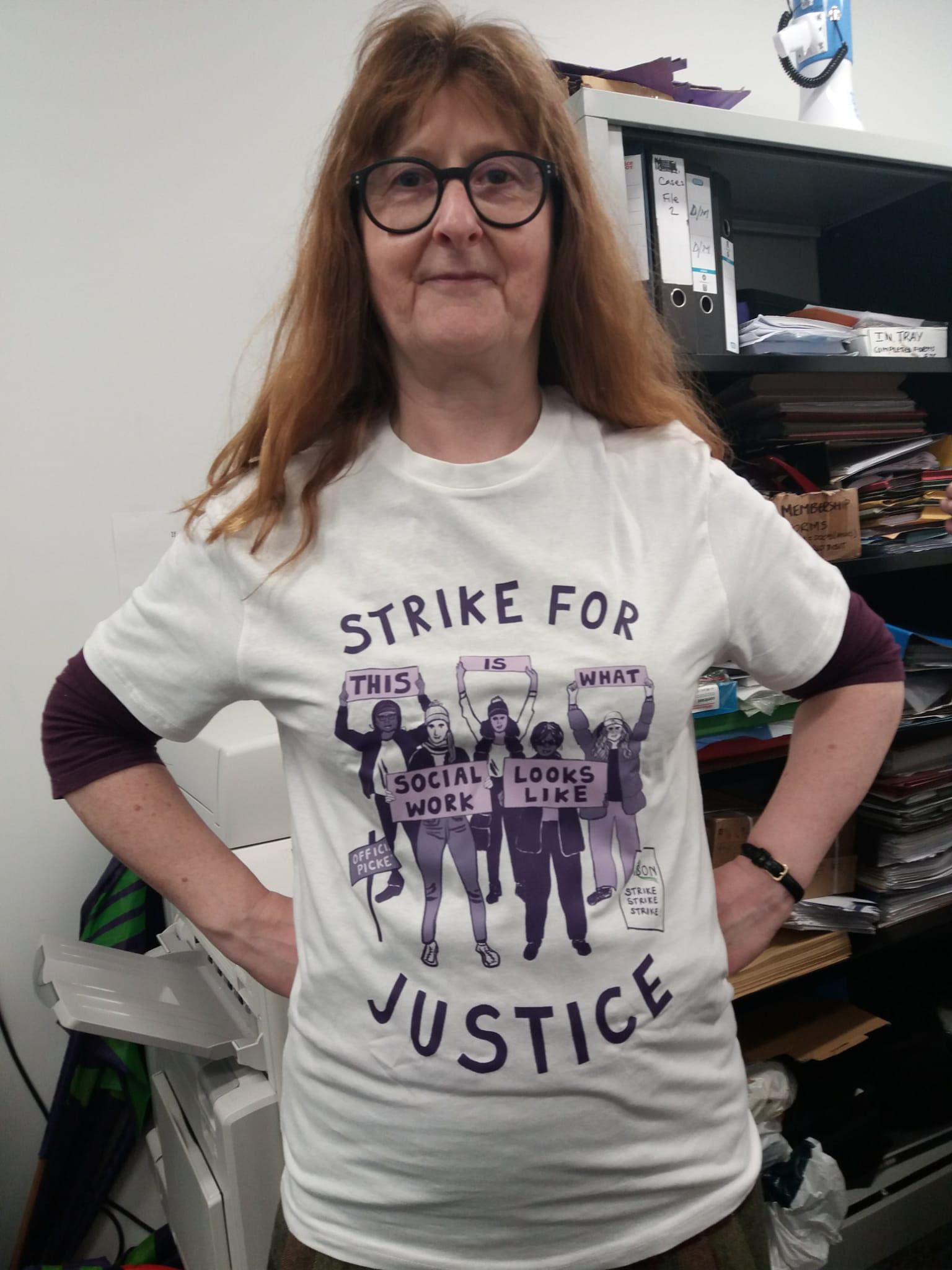
Big thanks to the Barnet resident who designed our Barnet UNISON Mental Health social worker strikers T-Shirt.
We are selling the T-shirts to raise funds for our Industrial Action Fund.
The T-Shirts are for sale £10.
If you would like to buy a T-Shirt, please email contactus@barnetunison.org.uk
End.
Barnet Voice : Mental Health crisis newspaper
Ex Barnet Council Mental Health social worker explains why she had to leave.
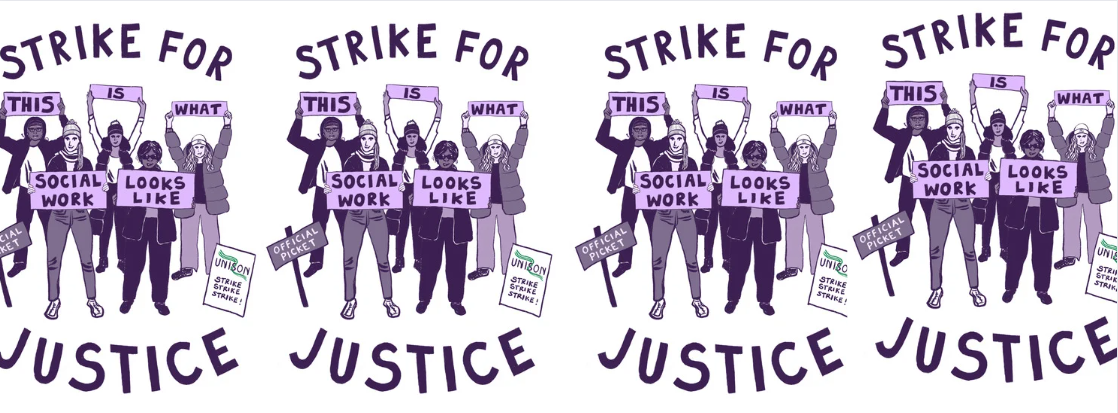
For the past two years Barnet UNISON has tried to engage with senior management in Adult Social Care to address the chronic exodus of experienced Mental Health social workers from the frontline Mental Health teams. There has been a catastrophic failure to understand the fundamental risks both for service users and staff because of the ongoing turnover of staff.
Our strikers have already taken 27 days of strike action and by the end of this next phase they will have taken 72 days of strike which equates to 1,305 lost working days or 13.050 lost contacts with Mental Health service users.
Below is a email which was sent by an ex Mental Health social worker. I will repeat what I have repeatedly said to senior management: “Don’t listen to me, listen to someone who actually works in these services, they are the ones who know what is happening and how bad it is.”
After you have read the email below, I hope you can do one of the following:
- Visit the picket line outside Colindale on Monday 15 April between 8-10 am
- Send a message of support to contactus@barnetunison.org.uk
Best wishes
John Burgess, Branch Secretary, Barnet UNISON.
“Dear Executive Director Adult Social Care
I am writing to you as an ex-Barnet mental health social worker in the hope that when you read my experience it will encourage you to meaningfully negotiate with striking social workers.
I left because the conditions that social workers were working in were unsafe for workers and unsafe for service users. I was part of efforts to alter this for 2 years. These efforts started as hopeful conversations with managers in which we expressed our concerns and were promised changes and ended with strike action as the situation worsened and none of the promises made by managers were fulfilled. In my first couple of weeks as a student mental health social worker in LBB I remember the Director of Adult Social Care asking me if I hoped to stay when I qualified. I replied that I couldn’t see a reason to leave as the location was good, the work interesting and the team supportive but after trying my best to stay, I realised that doing so would be to the detriment of my health and wellbeing due to under-resourcing, a reliance on junior staff for exceptionally complex work and huge waiting lists growing ever longer (to name just a few reasons).
The community mental health social work teams work with adults with some of the most complex and enduring mental health needs. They work with adults whose mental health has impacted their ability to complete the activities everyone needs to do in order to survive such as eating, safely using their homes, taking medication and attending essential medical appointments. They also work with adults where there are safeguarding concerns including concerns about self-neglect which is the most common category of abuse found in adult safeguarding reviews. However despite the complexity and risk involved in community work, it is viewed as “non-specialist”.
In my new role as a social worker in an NHS specialist mental health team my salary is 10% higher than it was in a community team while my caseload involves working with fewer adults at risk of serious harm and in which risk is shared among a multi-disciplinary team including psychiatrists, psychologists and community nurses who have decades of mental health experience between them. This experience safeguards the adults we work with and reduces the likelihood of individual practitioners feeling overwhelmed and stressed which is a leading cause of staff burnout in Barnet.
Alongside improved pay, more manageable caseloads, better resources and being able to learn from experienced mental health practitioners I also currently benefit from specialist training, better lone working practices and team administrative support. When I worked for LBB one of the arguments managers gave as to not provide a recruitment and retention payment was that social workers experience the same issues wherever they work and conditions and pay are the same everywhere. This is something said to keep social workers in their place and to stop them asking for improvements. I am proof that it is not true.
In the two months since I left LBB my mental health, physical health and work/life balance has improved. My colleagues who remain do so because they are trying their best to create working conditions that will enable them to stay in their jobs so they can support residents of Barnet but so far management seems to be against its workers and against supporting adults in Barnet who would benefit from the expertise and support of specialist, experienced community mental health social workers.
Please meaningfully negotiate with UNISON before all the mental health social workers leave or become unwell. It is your responsibility to work with social workers towards a solution but at the moment it feels senior management are hiding their heads in the sand which feels insulting to the social workers whose health is being put on the line trying to provide the service that Barnet residents deserve.
Yours sincerely,
Ex Barnet Council Mental Health social worker.”
End.
***Strike preparations commence for 15 April***
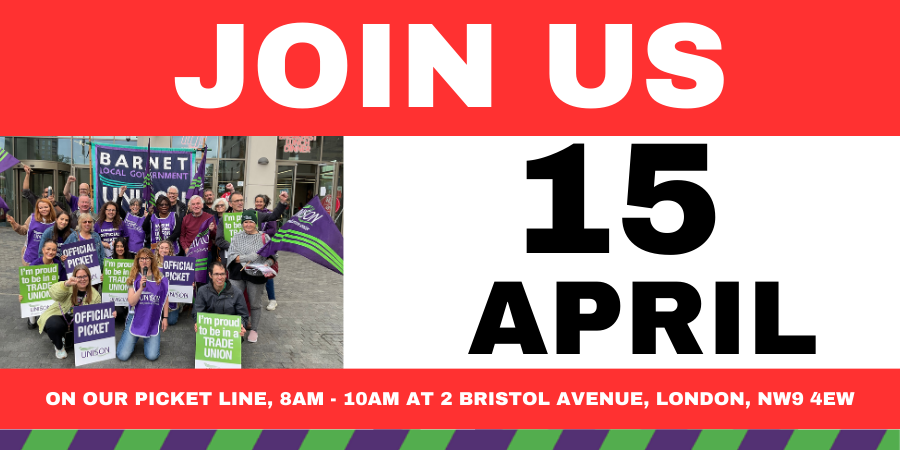
8 April 2024.
Dear Supporter
Barnet UNISON Mental Health strikers are due to start the next phase of strike action on Monday 15 April.
Our strikers have already taken 27 days of strike action and by the end of this next phase they will have taken 72 days of strike which equates to 1,305 lost working days or 13.050 lost contacts with Mental Health service users.
We have had two meetings with Acas where we have established that Barnet Council have confirmed that they do have twice the funding they would need to settle this dispute. It is now clear that thus dispute is not about the money and as each day that goes by it feels like this is an attempt by senior officers to break UNISON.
On behalf of our members, I am requesting all our supporters to join us on our picket line this Monday 15 April between 8-10 am.
The following speakers are currently:
- Libby Nolan UNISON President.
- Jo Galloway Regional Secretary, UNISON London Region.
- John McDonnell MP
- Lord John Hendy KC
- Shelly Asquith Health & Safety TUC
- Sam Gurney Regional Secretary London, East and South East TUC
- Kerie Anne Branch Secretary Tower Hamlets UNISON
- Liz Wheatley UNISON NEC rep and Branch Secretary, Camden UNISON.
More speakers to be announced later.
The Location of our picket line is 2 Bristol Avenue, Colindale, London NW9 4EW. Colindale station on the Northern line is the nearest station to our picket line. It is a 5-minute walk, turn first left out of the station.
Solidarity
John Burgess, Branch Secretary, Barnet UNISON.
End.



